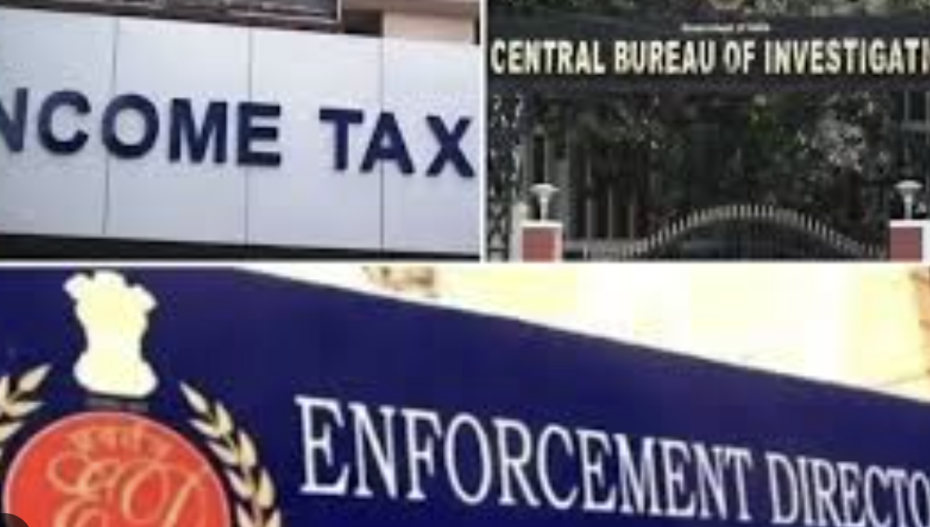The recent actions of the Income Tax (I-T) Department and Enforcement Directorate (ED) against opposition parties and their leaders have the potential to disrupt the level playing field during elections, said former Chief Election Commissioners (CECs). This was after opposition parties accused the party in power of using central agencies against them.
Congress leader Rahul Gandhi has accused Prime Minister Narendra Modi of “match-fixing” in the Lok Sabha polls by using central law enforcement agencies.
The Congress announced that it had received fresh notices from the I-T Department for 2014-2015 and 2016-2017, with a tax demand of Rs 1,745 crore. This followed notices the party had already received for 1994-1995 and 2017-2018, bringing the total demand to Rs 3,567 crore. The I-T Department has also withdrawn Rs 135 crore from the Congress’s bank accounts for previous dues.
According to the former heads of the Election Commission (EC), two of whom spoke on condition of anonymity, such actions could be seen as interfering with free and fair elections and should prompt the poll watchdog to at least meet the agencies to ascertain why tax demands and I-T notices cannot wait until after the elections are over.
“I personally feel the EC can certainly put it on hold because it is affecting the level playing field. Within the EC, the principle we always followed was ‘anything that can wait, should wait’ during elections. The question to ask is that is there any irreparable damage in postponing? There is no irreparable damage in this case. It can be done after three months,” former CEC S Y Quraishi said.
Another former CEC, who did not wish to be named, said: “Such situations never arose during our time in the Commission, so it is difficult to cite a precedent when the Commission would have stepped in. However, having said that, the objective of the Model Code of Conduct is to ensure that a level playing field is ensured for everyone participating in elections. If the tax agencies keep issuing notices to the principal opposition party when campaigning is on, freezes their accounts and even debits money from it, the Commission should ask CBDT for the compelling reasons on why this cannot wait till after elections? This can be done through a meeting between the Commission and CBDT.”
In recent months, the ED has also acted against Opposition leaders, carrying out searches, issuing summonses and making arrests in connection with separate cases. The most prominent arrest was that of Delhi Chief Minister Arvind Kejriwal last week and BRS leader K Kavitha earlier this month in connection with the Delhi excise policy case.
The former CEC said that when the ED summons leaders for questioning at a time they should be involved in campaigning, that too disturbs the level playing field. “The Commission cannot come in the way of matters of national security, but if it doesn’t involve that then can the I-T Department and ED not wait for two more months,” the former CEC said.
A third former CEC, who also did not wish to be named, said: “This is a tricky and ticklish issue and I can understand how difficult it will be for the EC to navigate this. But the fact is that how do you expect a political party to contest an election when its access to funds is cut off? Does this not affect the level playing field? As an umpire in this match, the Commission cannot remain completely mute and it will have to play some persuasive role by way of consultation or a meeting with central agencies to persuade them to defer actions such as raids and freezing of accounts and raising of tax demands till after the elections so that there is some semblance of level playing field.”
However, former CEC O P Rawat said the EC can only intervene if it has enough basis to suspect the law enforcement agency of wrongdoing. “Only in case there is evidence of delay on the part of the agency, that they intentionally delayed the action to coincide with the election campaign, or if they are conducting raids and not finding anything, then the EC can ask them to wait for the elections to be completed. But parties tend to politicise such issues and don’t approach the Commission with all facts and that is where it gets difficult for EC,” he said.
There is a precedent of the EC stepping in to tell the ED to act neutrally and impartially during the last Lok Sabha elections in 2019.
“The Election Commission would like to strongly advise that all enforcement actions during the election period, even when conducted ruthlessly with a view to curb this blatant electoral malpractice should be absolutely neutral, impartial and non-discriminatory,” the 2019 advisory said.
Also Read: Viral Video Shows Gujarat Man Thrashing Kin In US













